News Blog
Latest News From Our Volunteers in Nepal
VOLUNTEER COMMUNITY CARE CLINICS IN NEPAL
Nepal remains one of the poorest countries in the world and has been plagued with political unrest and military conflict for the past decade. In 2015, a pair of major earthquakes devastated this small and fragile country.
Since 2008, the Acupuncture Relief Project has provided over 300,000 treatments to patients living in rural villages outside of Kathmandu Nepal. Our efforts include the treatment of patients living without access to modern medical care as well as people suffering from extreme poverty, substance abuse and social disfranchisement.
Common conditions include musculoskeletal pain, digestive pain, hypertension, diabetes, stroke rehabilitation, uterine prolapse, asthma, and recovery from tuberculosis treatment, typhoid fever, and surgery.
FEATURED CASE STUDIES
Rheumatoid Arthritis +

35-year-old female presents with multiple bilateral joint pain beginning 18 months previously and had received a diagnosis of…
Autism Spectrum Disorder +

20-year-old male patient presents with decreased mental capacity, which his mother states has been present since birth. He…
Spinal Trauma Sequelae with Osteoarthritis of Right Knee +
60-year-old female presents with spinal trauma sequela consisting of constant mid- to high grade pain and restricted flexion…
Chronic Vomiting +

80-year-old male presents with vomiting 20 minutes after each meal for 2 years. At the time of initial…
COMPASSION CONNECT : DOCUMENTARY SERIES

Episode 1
Rural Primary Care
In the aftermath of the 2015 Gorkha Earthquake, this episode explores the challenges of providing basic medical access for people living in rural areas.

Episode 2
Integrated Medicine
Acupuncture Relief Project tackles complicated medical cases through accurate assessment and the cooperation of both governmental and non-governmental agencies.

Episode 3
Working With The Government
Cooperation with the local government yields a unique opportunities to establish a new integrated medicine outpost in Bajra Barahi, Makawanpur, Nepal.

Episode 4
Case Management
Complicated medical cases require extraordinary effort. This episode follows 4-year-old Sushmita in her battle with tuberculosis.

Episode 5
Sober Recovery
Drug and alcohol abuse is a constant issue in both rural and urban areas of Nepal. Local customs and few treatment facilities prove difficult obstacles.

Episode 6
The Interpreters
Interpreters help make a critical connection between patients and practitioners. This episode explores the people that make our medicine possible and what it takes to do the job.

Episode 7
Future Doctors of Nepal
This episode looks at the people and the process of creating a new generation of Nepali rural health providers.

Compassion Connects
2012 Pilot Episode
In this 2011, documentary, Film-maker Tristan Stoch successfully illustrates many of the complexities of providing primary medical care in a third world environment.
From Our Blog
- Details
- By Debbie Yu
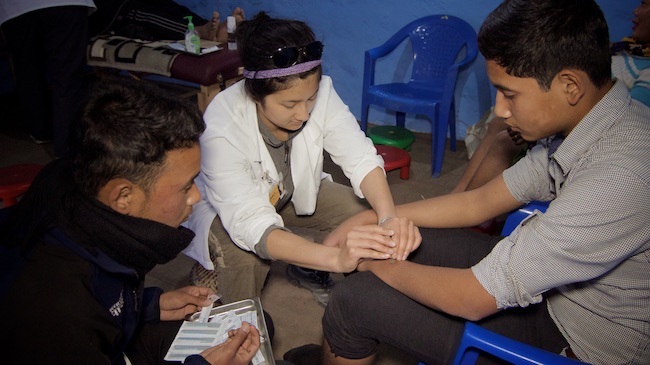
“I believe that through open dialogue of not only my successes, but also my fears, challenges, and weaknesses, I will come to a greater understanding of myself and will help others do the same.” - ARP Volunteer Handbook
February 9, 2015
It’s our day off and we are traveling to a “palace” about 3 hours away for a team picnic. Our bus is full, and the trunk is packed with cooking supplies and food. We make one stop for more fruit and food, and another for this sugary milk fat condiment, kua. And then we just keep driving…
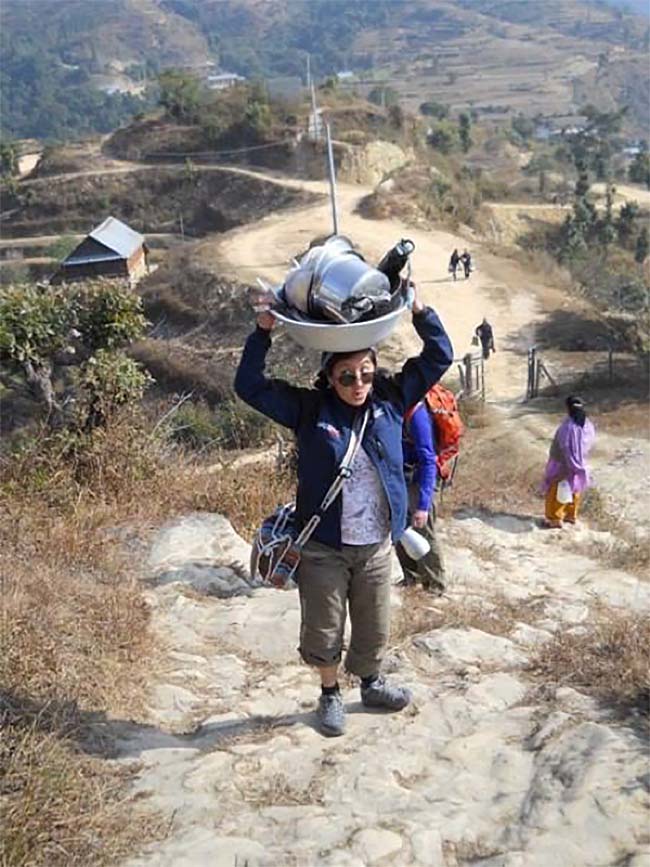
We arrive! But we have to walk about fifteen minutes up to the top. I carry a large stainless steel bowl of more bowls and utensils atop my head because that is the only way I’ll be able to manage. I get a glimpse of what the average day is a like for the average Nepali woman, and how life taxes their bodies. Life taxes our bodies in the States too…just in a bit of a different way.
Auntie, Jessica, Urmila, Suman, and Ritesh immediately get to work. They are all speaking Nepali and moving quickly. I’m not sure what is happening, but I want to help. I assist with washing and prepping the vegetables. That I can do without much communication.
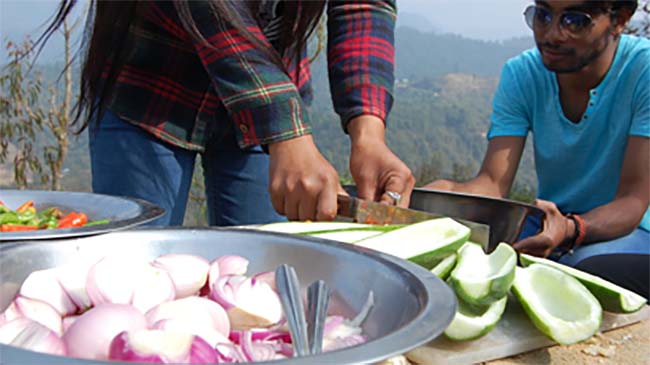
We walk down to the “sink” about 100 meters away. The ergonomics are not the most ideal for our bodies, but there is so much beauty in the scene that it doesn’t matter. There are five of us squatting around this stone sink. We are washing a five liter bucket of tomatoes, julienning daikon, and slicing onions, all against a backdrop of mountains, trees, blue skies, and the clear horizon. Though Urmila and Jessica are chatting away in Nepali, we are all still there together, working together, creating a meal together. It’s just…great.
"DUDH CHIYA!" Ah, the milk tea is ready. We’ve had so much milk tea since arriving, and this is probably the best yet because it was made over a campfire and because it was made with all of us there!
Then we have our bacon egg sandwiches for breakfast! Whoa is right. We are all feeling protein deprived, and this is certainly a treat.
As we clear the plates, I see Auntie preparing a giant pot of beans. “She’s cooking more?” I ask Tiffany. “Yeah, lunch” I thought the sandwiches were lunch! Nope. There will be more, much more. So, while we digest before lunch, we go for a walk and tour of the palace.
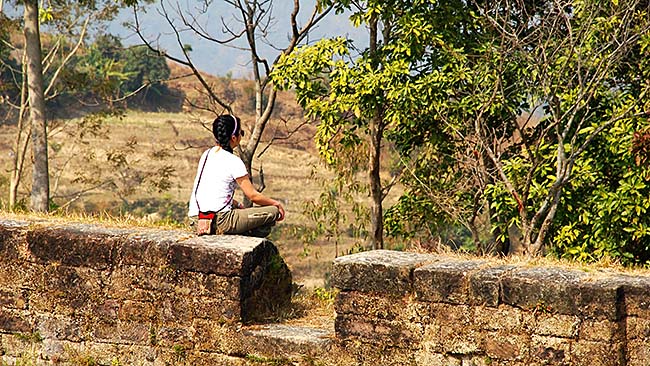
I’m sitting atop a stone wall where cannons were once placed, looking out into the horizon.
I didn’t intend to, but the space was calling. I find myself in lotus position.
Tell me the secret.
My eyes softly close.
Nothing.
Wind brushes my skin. Do I go with the flow- with the wind, and let it carry me? Do I stand like bamboo and find flexibility? Do I stand like an old thick tree and stay as still and strong as can be? Tell me.
Then the wind stops. I feel the sun warm my neck and back; it envelops my heart. The sun nourishes me. It lets me grow and be loved.
My spine is straight, my shoulders are back, my eyes closed, and my heart is open. I hear footsteps and wanted to open my eyes and break away from this moment…but don’t. Its not like I feel danger, just don’t want to be seen like this. But if I open my eyes, will I be shaming myself? Won’t I be illustrating that I am not good enough – for this love I am receiving and worthy of?
Why am I here?
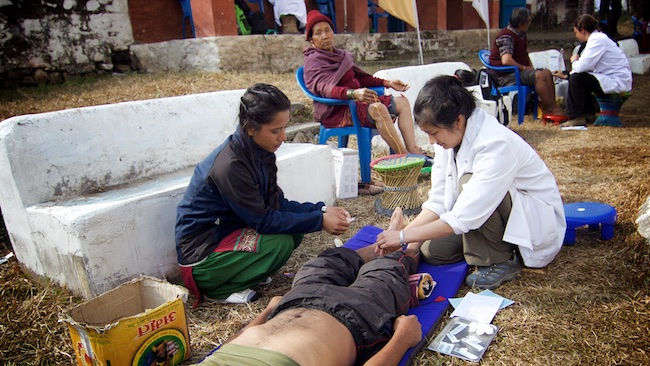
If I can’t receive, how will I give? How will I become the practitioner I want to be – my whole purpose for this trip? I want to be the practitioner who not only who treats with competence but more importantly with care and compassion.
Hmm maybe that is what I needed – to know that I am worthy of love and compassion, and to forget all that bullshit and questioning of the pathway – whether or not I am on the right one, or doing the right thing. It doesn’t matter in the end. In the end, it all boils down to love and compassion (how many times can I say those words?) Cliché? Maybe. But so true.
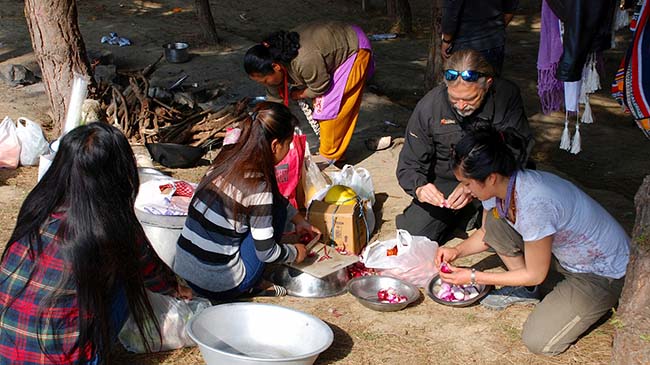
From slicing vegetable with friends to my own meditation, there are many ways for me to practice. I’ll grow as a practitioner. I’ll grow as a person. - Debbie Yu
- Details
- By Bex Groebner
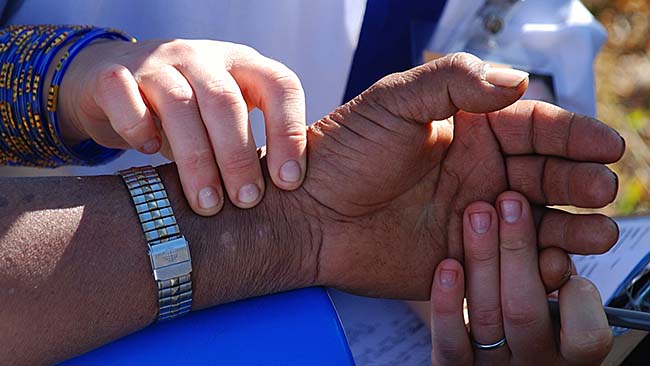
He's sitting in an 8x10 concrete room with two beds in it. There is a small space heater and a post where the rusted, gigantic oxygen tank is tied with a bow made of hemp cord. There are three mudas, or woven stools, sitting on the floor. His family members usually sit on these stools but they offer them to Debbie, Ritesh, Bibeck, Pawan, Milan and I because we've come at this late hour for a house call.
He is cross-legged on the bed, propped up against four stacked pillows. There is a fleece blanket draped over his shoulders, like something you'd find in a young American girl's room; cream colored with orange and white flowers. He wears a maroon sweater over two shirts and a thick, knitted beanie with a pom pom on top. Despite this, he's still cold and it's an effort for him to stick his fingers out of the blanket so that we can put the pulse oximeter on it. He does it patiently and for as long as we ask and when we are done, he quickly puts his hands back under the blanket. I see that he is anxious, he's afraid to die. I take his right hand and massage it gently, while I check the pulse oximeter on the other hand to see if the number has gone up. He sticks his left arm further out of the blanket and motions to a large area above and below his elbow. I ask him, "What happened?" Ritesh translates: "He got these at the teaching hospital in Chitwan, they kept trying to take his blood." I look more closely, some of the bruises are the size of baseballs, two on his upper forearm, one at the medial elbow and three more below. He points to a small dot at the mid-forearm telling us, "They were finally able to get the blood when they tried down here."
I feel my face get hot as I look into his sweet eyes. More of his arm is bruised purple than not. First, Do No Harm. I am overcome for a moment as I imagine the nurses or doctors at the hospital sticking him over and over with needles as he's having breathing difficulties. He puts his arm back into the blanket with a small shake of his head about the bruises. I look at Ritesh and I see that he understands I am mad. He says, "There's nothing you can do." I know it's true and I swallow it down and move on.
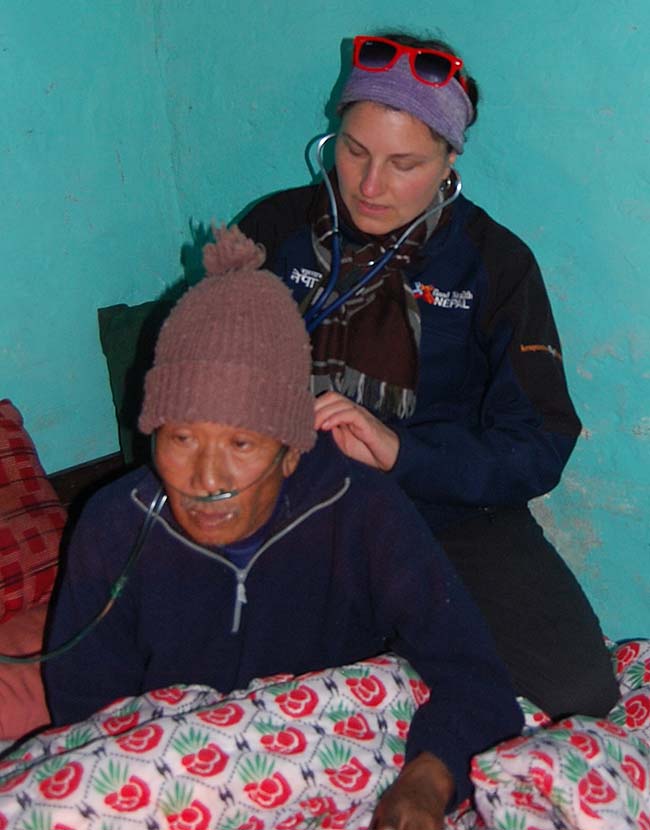
Debbie gently rubs his back between his scapulas. We are both sitting on the bed and doing everything we can to calm him down. Terry, our team lead, is in Kogate and Andrew is in Kathmandu. We can get them on the phone if we need to but otherwise we are on our own. There are four interpreters with us, everyone is watching us.
The tank is bubbling in the background, but as Bibek checks it, the pressure meter slowly falls to zero. We look at the pulse oximeter and see that our patient's blood ox levels have dropped into the low 70's. Ritesh makes a phone call for more oxygen.
The tank arrives and it takes three people to carry it in the room. It's five feet tall and looks like something Jacques Cousteau pulled up from the depths of the ocean. I expect an old metal diving suit to be attached to it, but nothing is, which is part of the problem. The neighbor takes his time fussing with the hemp cord around the old tank. Debbie calls out, "Can you please hook up the oxygen before you tie the tank up?" Bibek translates. The neighbor ignores us all, like we are flies in the room where he is doing some serious negotiation with the ratty cord. Debbie repeats. Bibek repeats. We are ignored again.
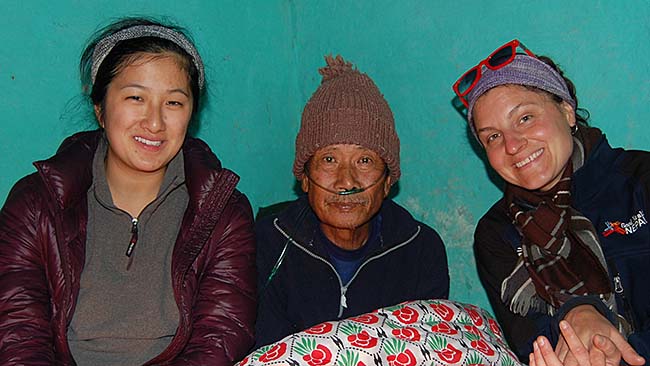
Twelve minutes have passed since the oxygen ran out. Our patient's cells are starving. I am scared and I can tell Debbie is too. We have to get the oxygen levels up but all that's going up is his pulse rate: 103, 106, 108. Debbie's thumb sits gently under his clavicle bone. She is counting his breaths. "Forty." "Forty-four." "Forty-six." His respiration rate is grating in the background like nails down a chalkboard. His eyes are pleading. He is drowning. Everyone is quiet. None of us can breathe. I check my watch: Fifteen minutes at 70%.
I look to the neighbor; should I grab the damned tank and do it myself? He has finally tied the bow and inserted the valve piece. Now he is fumbling with a wrench to tighten the seal. His incompetence is maddening. I think I could do it faster, yet I don't budge. I don't want to stir the calm. I stay frozen like all the others, watching, waiting, hoping for that top number to start trickling up so that we know his cells are going to live. I am trusting that something higher, perhaps one of the thousands of gods or goddesses that live here, is in the room with us to help this guy get his wrench dialed into the right setting and set the oxygen to flowing. They say that the Nepalese have so many gods there are three for every human. That makes twenty-seven gods in the room with us. Eighteen minutes.
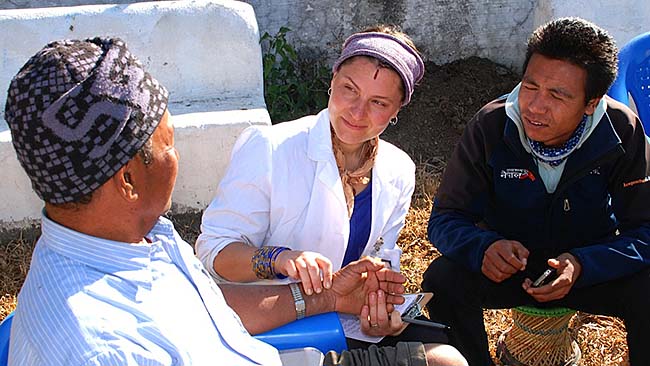
Finally, the pump is turned on. Debbie and I haven't helped hook a patient to an ancient oxygen tank before. We don't know anything about this old bubbling gauge, nor what the setting should be on. Regardless, the oxygen finally flows and the number on the pulse oximeter flashes up to 74. The heart beat goes down to 102. Debbie lets her breath out and whispers, "Forty four." We are moving in the right direction now.
It's been eleven days since that first home visit to "Uncle" Lal Lama's. Since that time, we've stopped by his house almost every day, sometimes three times a day, to monitor his vitals. This has to be done during our lunch break or after a full day of work. It requires that one of the translators gives up some of their downtime to come with us and we are so appreciative of their willingness to do this.
We have communicated to the family that our recommendation is for them to go to the hospital. They have refused, saying that the hospital in Chitwan said there is nothing more than can be done for Lal. They don't trust the hospital either, due to a series of negative experiences that have made them quite scared to go there. The hospitals here can be very scary places. Our team can't do much more than monitor Lal's vitals and provide some anxiety relief with acupuncture and we've let the family know this. They still refuse hospital care.
Our Uncle is not getting better. For the first week after our initial home visit, he was able to get off the oxygen tank for 10 or 15 minutes and venture into the concrete patio outside of his bedroom. Each gigantic oxygen tank would last for around 48 hours. This week, Uncle cannot get off the tank without plummeting into respiratory distress. Some tanks last for less than a day.
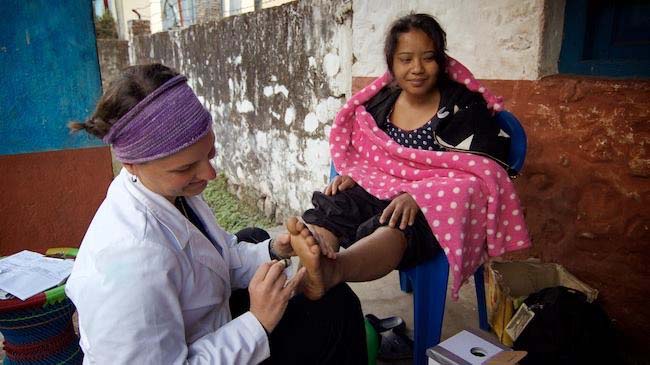
He is pinned in his small, dark room, like a undersea diver who is just visiting this life for as long as the oxygen will last. I have seen him moving through the stages of grief as he realizes that his time here is short. I have moved through these stages of grief with him. One afternoon, Ritesh and I arrived to find him in a splendid mood. He was telling us stories about his boyhood. He was living in Kathmandu and had gone to art school. He would travel up to the Monkey Temple and look over the Himal. He would draw or paint the Annapurna range in a series of mediums, ranging from charcoal to watercolor. He was also a sculptor and carved a number of animals at popular temples. He won an award from King Bhirendra for a gigantic elephant he created and painted, poised on springs so that as it was wheeled in front of the king, a spring popped and the large trunk swung up to salute the patriarch. He was an entertainer and dancer in a comedy troupe and it brought him great joy to give all of his gifts of creativity to his community and country.
The day that Uncle told us these stories about his life, I started crying as I was behind him, checking his lung sounds. Ritesh could see me as he translated and I wiped the tears away and tried to regain a professional demeanor. I took deep breaths and sat with Lal until he was finished telling his stories. On the walk back home, I tried to hold it all in, until I could get to my bed and bury myself in my sleeping bag to cry. I couldn't make it and burst into tears about 50 meters from the patient's house. I took off my white coat and held it over my face, as if it would stop Ritesh and the town of Bhimphedi from seeing me do this. Ritesh put his hand on my back and said, "It's okay. I can't cry so maybe you can cry for both of us."
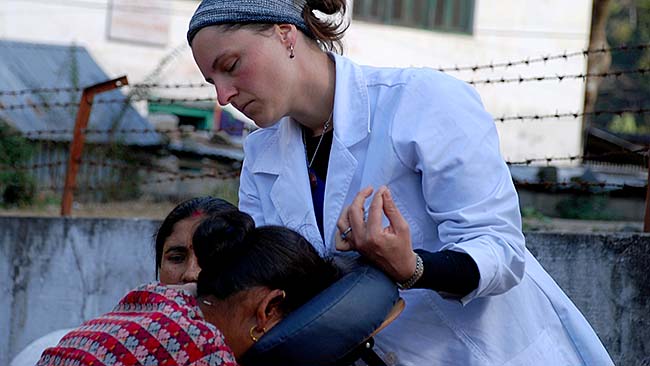
It was awful to walk up to the house and find the whole team sitting outside. They saw me crying and there was no way to explain it. Lal was in a better mood than he'd been in for days but they all worried that something bad had happened. I told Andrew he was fine but listening to Uncle, I knew he was going over his life and that he was getting closer to his death. I was also starting to realize what an amazing person I had just been sitting with. I know we are mortal, but as I sat there I saw that no matter how amazing we are, we will all die. I will die. No matter how I love, how I live or where my hopes lay, I will die. As I sat on my bed crying, I saw that I was crying for myself, not Lal. I was crying for the mirror that Lal had just held up before my own life. I am just another diver in this ocean, a diver with a tank that is a little bit more full than his, but who is equally exploring this beautiful shipwreck and will have to go up to the mysterious surface again at some point.
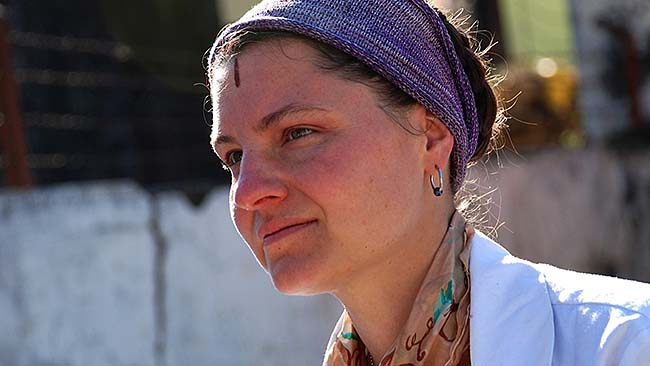
I applied to ARP and I came to Nepal to find myself because I had started to question my identity this year. Each patient and every team member here is holding up a mirror for me to look into my own soul. I have spent so many years criticizing myself and never finding myself good enough, but some of these mirrors are shining back a spirit of generosity that I never acknowledged. Lal is showing me that I need to honor this amazing part of myself and I need to continue to live life as fully as I can. I need to spend my time in this adventure looking for the treasure that I know is there. I miss all of you back home and I send the greatest amount of love to you all. --- Rebecca "Bex" Groebner
- Details
- By Eliot Sitt
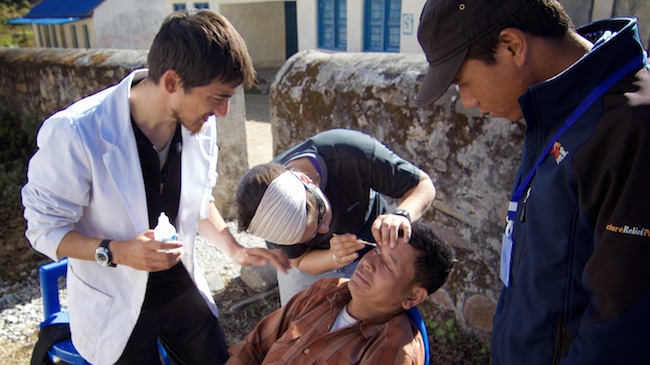
I knew I wanted to volunteer with the ARP when I first heard of it four years ago, during my first year of acupuncture school. Now, sitting in my guest house in Kathmandu with dogs barking and gentle Nepali conversation drifting in through the window, it’s sinking in that I’ve fully realized that intention. I’ve spent more than six weeks treating patients in rural Nepal, doing my best to help however I could manage.
Earlier today I met a man named Rajesh playing guitar in front of his friend’s collectibles shop, and I ended up hanging out there for hours. Turns out he grew up near Kogate, the small village where Rachael and I ran our free clinic, and he told me how happy he was that I’d been volunteering to help people in his hometown. I told him I felt grateful to be there, far from the bustling noise and bad air of Kathmandu, where I could get a glimpse into the heart of Nepal. Most of Nepal is as rural as Kogate, and I feel lucky that I could live in such a small but beautiful community.
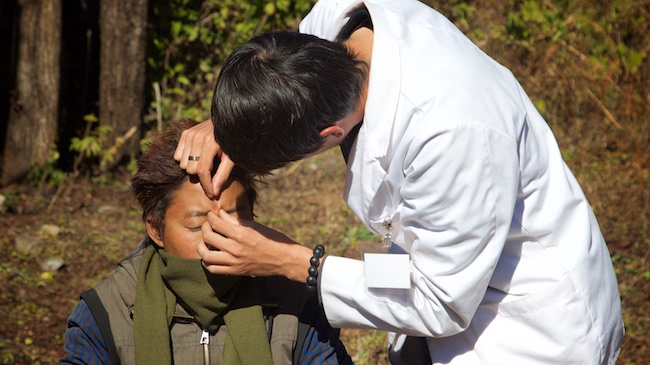
Most of the team stayed at a town called Bimphedi, which itself is hours away from Kathmandu. Kogate is about a three hour hike up the hill above that. Although Bimphedi seemed tiny when I first arrived there, its few dozen shops and paved main road made it feel like the city after my first week in Kogate. There no roads are paved, and the only traffic besides the occasional motorcycle is a rickety bus called the Himali Tiger that makes its slow, bumpy way up and down the mountain once a day most days of the week. Even this luxury is relatively new: there was no bus service about seven years ago. One patient shared the story of when his wife hurt her knee badly enough to require surgery. He and his neighbor had to carry her down the mountain to Bimphedi to catch a bus to the nearest hospital in a town called Hetauda. At that time, any supplies from Bimphedi also had to be carried.
Rachael and I stayed at the end of the bus line with the parents of one of our interpreters, Suman. They asked us to call them Ama and Buwa (mother and father), and they welcomed us into their home like family. We shared their same food, and our only extra luxuries besides what we brought were an electric kettle and a filter for the water from the outdoor faucet. Even electricity is relatively new to Kogate, set up within the last couple years, and Suman told me that the village didn’t change all that much as a result. Mamta, his sister in law and our other interpreter, also stayed with us, and our receptionist, Lanka, met us each morning after an hour’s walk from her home down the hill.
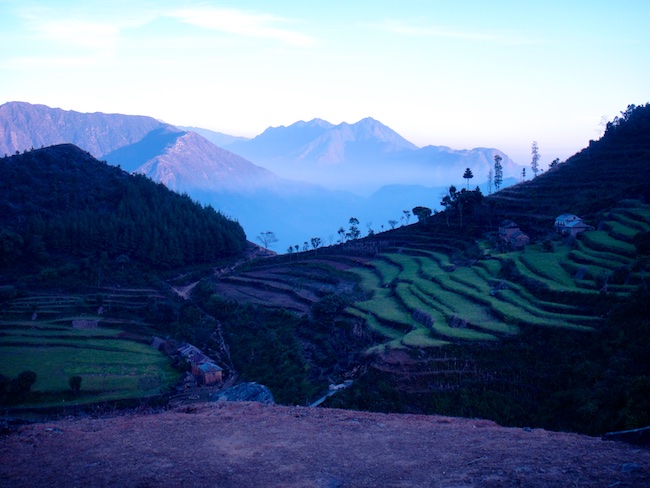
During our stay, Rachael and I slowly became recognized community members. We’d meet our patients and their relatives on our walks to and from the clinic and exchange enthusiastic Namaste’s with schoolchildren. I played soccer with the boys who hung out near the clinic, and kids often watched our treatments from the stone wall that surrounded our clinic. One of my most regular patients was also Suman’s good friend, and we hung out together outside of the clinic. I taught Suman a little tai chi and had a blast teaching them both to juggle. Rachael did a great job memorizing all of her patient’s names and began to recognize which of her patients were related. We’d see one patient herding his buffalo and another her goats near the clinic. Even our bus driver came in for one treatment. We were much less busy than the Bimphedi clinic, which served many patients that came from many hours away, but almost all of our patients knew one other as members of the same community.
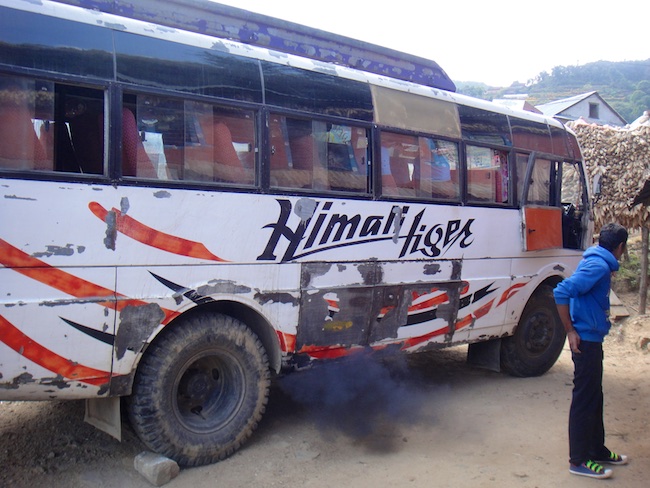
On the second to last day of clinic I got a new patient who was visiting his daughter in Kogate from a more remote place. He has an enormous lemon-sized cyst under his right tricep compressing the nerves in his arm, causing pain down his hand and reduced motor function. He had gone in for surgery three years ago, but after draining fluid from the cyst, it swelled up again, becoming larger and more painful. He came back the next week, and he told me that at that point they wanted to amputate his entire right arm, which he refused. (I’m hoping this was a miscommunication, and that they meant to explain that completely removing the cyst would cause nerve damage in his arm that may then lead to such deterioration as would need amputation.) He also has knee pain, and when rolling his pant legs up for the acupuncture I saw severe psoriasis on his right foot, which he scratched to the point of creating sores that were open and bleeding.
This patient really drove home the issue of access to me. His hometown was a 2-3 day journey away, so it was impractical to refer him for treatment during the next camp in Bimphedi. The two treatments he would get from me would be all the care he was likely to get, and I knew there was only a little I could do. I explained that I couldn’t help decrease the size of the cyst, but we would try for some temporary pain relief for his arm and his knees, and I bandaged the open wounds on his psoriasis. He understood and wasn’t upset. He said he didn’t mind because could hide the cyst from sight under his jacket and the pain was managable if he was careful not to bump it, and the psoriasis he’d had since childhood. At his second treatment he at first reported “no change,” but went on to say that he’d had no arm pain at all the previous night and had noticed that his knee pain was less. I know this relief will be temporary, but it’s something.
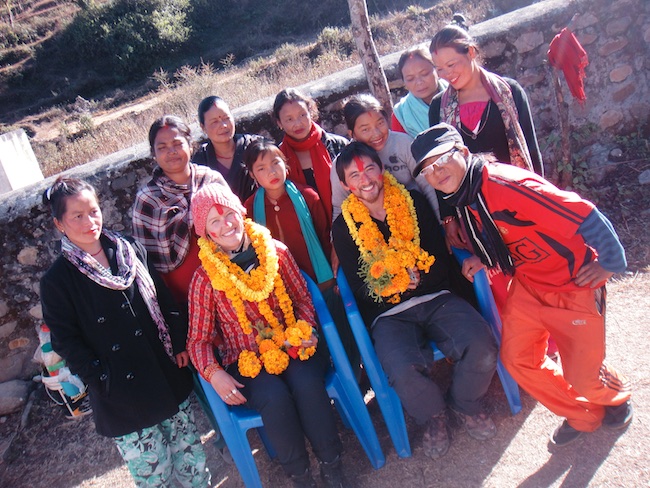
On a larger level, I worry that our time in Kogate likewise provided only temporary relief for long term problems that we can’t fix, problems that boil down to a lack of adequate health care access. Over the next two months, the smaller number of volunteers for the colder season means that the ARP can only be there once a week instead of five days a week, and because of the lower patient numbers, I don’t know if the ARP can sustain a clinic there long term. The volunteers’ time could be better used in a busier clinic, and Kogate is already closer to the Bimphedi clinic than the hometowns of many of its current patients. But after being welcomed so warmly it was hard to leave not knowing how much continued care our patients would receive in the future.
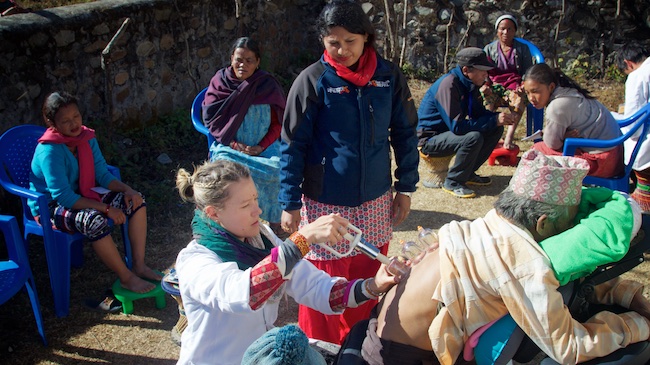
Now that my time there is done, I have to take comfort in knowing that we did what we could, and for better or worse, all our actions there have created ripples. People came in for anything and everything, including cuts that needed bandaging, common colds, rashes, sore backs and knees, headaches, and gastritis, and we did what we could to help whether or not acupuncture and herbal medicine were indicated. We used whatever we had: pain patches, moxibustion, massage oil, eyewash, anti-itch cream, cough drops, and ibuprofen – anything appropriate. Rachael even used a few candles and layers of acu-tape to even out the handles on the crutches of one of her patients to help his structural imbalance. And although we’ve left already, for a time at least we were there and genuinely willing to listen and help, a sentiment often missing in local hospitals. (The woman who was carried down the hill for a knee surgery, for example, came back with her knee cap sewn back on too far up, in spite of her husband’s unheard attempts to object while watching the surgery.) One of our friendliest and most talkative patients, who enthused that our treatments gave him “a new life,” told us he thinks a big part of his improvement was due to our kindness and smiles. And on our last day, we were overwhelmed by the handmade necklaces and bouquets of the fragrant orange flowers our patients brought us to wish us a safe journey home.
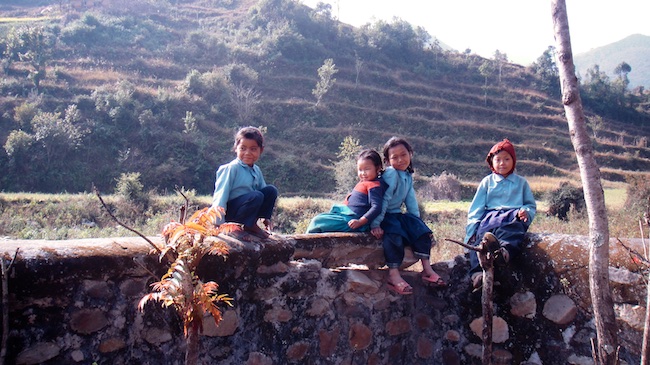
I know my experience in Nepal will have ripples in me as well. In the face of different complaints and fewer resources, I found myself doing such doctor-like activities as dressing wounds, taking blood pressure, monitoring blood glucose, taking temperatures, looking down throats with a tongue depressor and penlight, and examining painful eyeballs for irritants. This experience, in addition to the practice with acupuncture and herbs, will help me give better and more complete care to my future patients. I’ve also come away with the realization that people aren’t so different all around the world, and that I didn’t necessarily need to travel halfway across it to find folks who need more or better medical care, particularly in rural areas. Regardless, I will miss my Nepali patients and friends, and if whatever community I find in the US can spare me for long enough, I hope to return to Nepal to come see them. - Eliot Sitt
Project Director's note: Don't worry about Kogate. It is a village very near to our hearts and we will continue to support it as we develop our sustainability plans in Makawanpur. In fact, I hope to retire there one day.... I have my hilltop all picked out. -Andrew Schlabach
Our Mission
Acupuncture Relief Project, Inc. is a volunteer-based, 501(c)3 non-profit organization (Tax ID: 26-3335265). Our mission is to provide free medical support to those affected by poverty, conflict or disaster while offering an educationally meaningful experience to influence the professional development and personal growth of compassionate medical practitioners.
